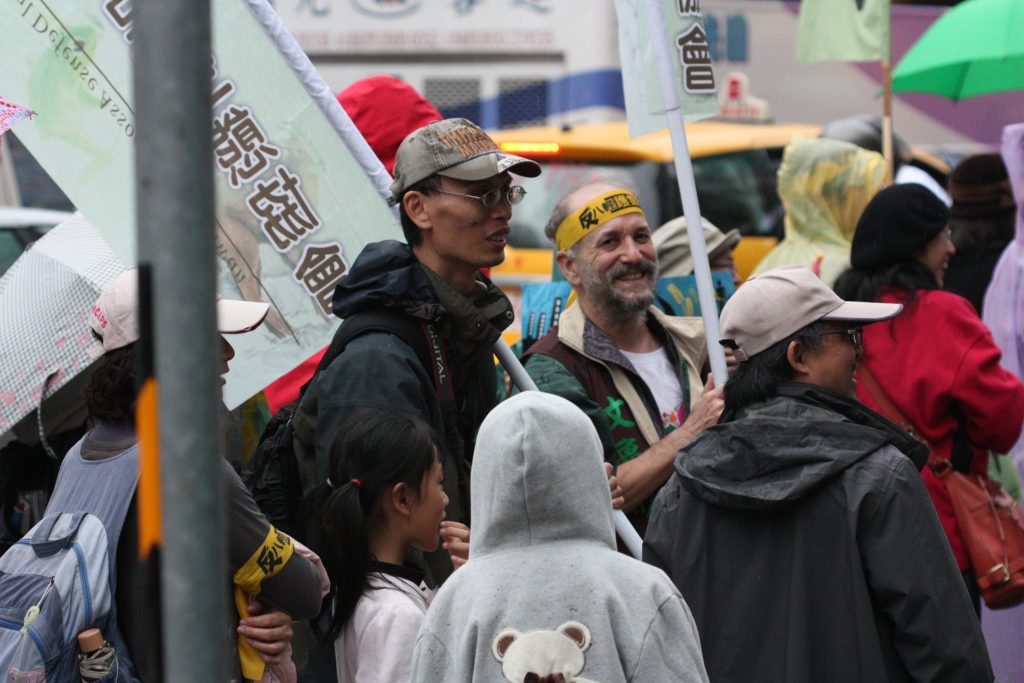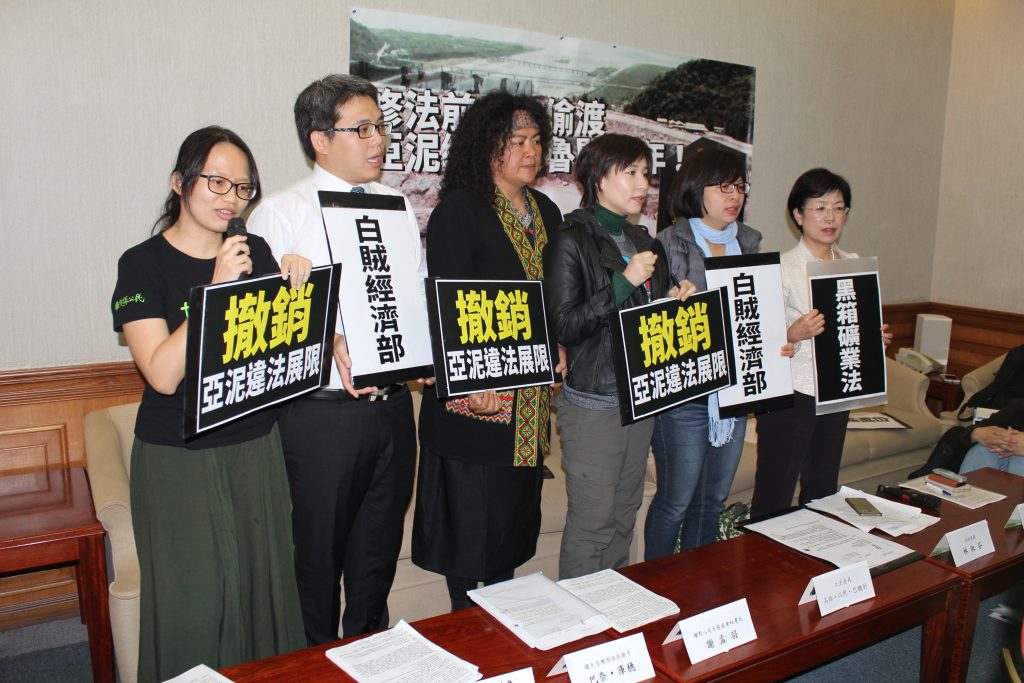Wild at Heart: Meet Them and Know Why They are Wildly Ambitious
Interview with Robin Winkler by Sonia Astudillo and Dan Abril

Taiwan’s Wild at Heart’s story is as provocative as its name suggests. Founded by a former commercial lawyer turned environment activist, the organization is driven by its philosophy of respect for all life.
The organization’s founder, Robin Winkler, was at the height of his legal career when he had an epiphany. “I had big clients who employed very nice people. However, the employers – my clients – were not people, they were basically machines programmed to make as much money as possible with as little cost as possible – often attributes of people who are ‘not nice’.”

On Human Rights Day – December 10, 2003 Wild at Heart Legal Defense Association Taiwan was officially launched and was subsequently registered as a civic organization under Taiwan law with the primary purpose of lending legal support to marginalized communities affected by short term development objectives of government and industry. Translated to Chinese, “Wild at Heart” has a number of possible interpretations, one of which Robin recounts is “extremely ambitious, wild at heart, and taking action” Indeed, listening to Robin recounting Wild at Heart’s journey and work – it certainly sounds ambitious.
“Wild started with myself and two others. Now there are three full-time lawyers and six to eight other colleagues.” Eighteen years later, Wild at Heart Legal Defense Action is one of the three organizations in Taiwan that focus on both human and non-human environmental justice from a legal perspective.
We sat with Robin one afternoon and in between his discussions of eastern philosophical thought and western sociological theories, he shared Wild at Heart’s struggles and how the organization continues to fight for the people, the animals, and the planet.
What are Wild at Heart’s top priorities?
There are many answers to this question but essentially our priorities are based on redistribution of resources to serve interspecies and intergenerational justice.
Quite simply we aim to alert people to our dependence on the “Others” – other generations both past and present, other species, other phenomena, and how our culture is destroying our base. Humans might try to reflect more on what we have and by doing that is driving so many to extinction. Creating is important, but that comes naturally from our existence. We also need to resist – that is paraphrasing Gandhi.
Another ‘Gandhism’ that informs Wild’s mission is “The earth provides enough to satisfy every being’s needs, but can never provide enough to meet any person’s greed.”

What are the main ongoing campaigns?
Many projects relate to indigenous people and the lands they have belonged to for thousands of years. A prime example is a case that began even before Wild was established. It involves the government and industry taking land belonging to the Truku tribe and using that land to mine minerals and produce cement.
We also work with fishers and farmers whose livelihoods are constantly under assault when someone decides their lands or waters can be more “efficiently” used for industrial development or energy projects.
Since 2007 we have been trying to stop a fossil fuel development project on the northwest coast of Taiwan that threatens a seven thousand-year-old algal reef, and more recently, through education, lobbying and litigation, we are trying to bring attention to the plight of a small group of (around 65) critically endangered subspecies of endemic dolphins.
Our work is far-reaching and our current campaigns are based on what interests our colleagues when local people approach us, or as in the case of the dolphins, what we identify as important). If I were to name an overarching theme it might be the continuous threat of industrial development on Taiwan’s biodiversity.

What are your biggest accomplishments/achievements?
Very few ‘accomplishments’ are done on our own. Together with many, many other groups and individuals we stopped the construction of petrochemical and steel plants and have had some success in litigation, for example, getting legal standing recognized for people living next to a planned incineration facility.
Our first case using the law to address the theft of land from the Truku, began in 2003 and continues to this day. There have been some victories along the way, but one must be careful in claiming ‘victory’ as the developers and their government obligors are always ready to seize on opportunities for short term exploitation. We have been successful, again, working with other organizations and individuals, in forcing a much higher level of transparency and disclosure by government and private industry.
But the real contribution of Wild has probably been to bring attention to the fact that the judiciary may provide an avenue of relief to those deprived of environmental and social justice. This possibility of relief often comes after extensive effort and energy has been expended on lobbying and media work but has failed to move the Executive and Legislative branches from their service to short term commercial interests.
There are currently three environmental justice groups in Taiwan. Wild to a certain extent played a role in the formation of the other two, and the three groups frequently cooperate.
What challenges are you facing? How is your work impacted by the COVID crisis?
The pandemic has been horrible in terms of packaging and other single-use products because the industry can readily exploit the misconception that their products are somehow safer. In an ironic twist, our Environmental Protection Administration, which was at one time quite active in trying to reduce waste, has been using the very high collection rates stemming from the use of single-use items since the pandemic, to take credit for unprecedented “recycling”.
For a couple of months, the pandemic also caused delays in the courts. Government meetings have almost all gone online which has its good and bad points. Overall the pandemic slowed consumption and thus we had a dip in adverse human impact on the environment, but I think that many public interest groups such as Wild have suffered a sharp decline in community support as a result of the pandemic, i.e., support from the community in the form of donations is way down.

What are the main environmental issues that your country/region is facing?
In many ways, Taiwan seems to be regressing on environmental issues from when Wild first began in 2003. Much of the early enthusiasm for composting and waste reduction programs are falling off and the government started massive privatization of so-called “environmental services” such as waste disposal, water treatment, and so on. These projects frequently end up incentivizing waste by obligating the government to meet certain minimum thresholds so that the private entity reaches its desired economic objectives. This results in many otherwise recyclable items (e.g., leaves, kitchen/food scraps, paper) going to the incinerator. This not only truly ‘wastes’ resources, but in the case of food scraps, it constitutes a high portion of what goes into the incinerators and severely compromises the efficiency of the incineration process.
Natural gas has been a critical component of the ruling party’s energy policy for decades and they have managed to persuade most of the population and the media that it is “clean energy”, conveniently ignoring its life cycle and the fact that this is fossil fuel. By promoting natural gas as clean energy, the government has caused divisions within the environmental and social justice community, with several NGOs supporting the government’s new liquefied natural gas projects.
How do you see your organization’s work evolving in the next few years?
In 5 years, I hope all the problems we discussed are taken care of and the existence of groups such as Wild at Heart is no longer needed. However, I do not see that happening in five years’ time. To be more practical – based on what I have observed – there is a growing awareness of overconsumption, destructive energy policies, and social and environmental justice. With that, I can see that in five or ten years – we will receive support from communities and more people will actually start working in public interest advocacy groups such as Wild because more people will see this as important and meaningful work.

What are your thoughts on the waste crisis that many countries in your region (and in the world) are living in right now?
One of the worst aspects of our modern industrial civilization is the waste trade. Waste from Europe and North America are exported to Asia and they expect receiving countries to clean it up for them. In nature, there is no waste, yet our industrial society has built a major component of our economy and society around the generation of waste. Groups that promote the waste trade and things like waste incinerators are very well organized. That’s a cue to us that we need to be savvier and move at the regional level as well. There must be cooperation among us. For Taiwan, however, this presents a problem. Our situation is unique in that Taiwan is not in the United Nations and our civil society, or NGO community is not very well integrated with our foreign counterparts. We are rather isolated and don’t reach out enough to other countries.
How does your work on waste relate to social justice?
We fight and speak for marginalized sectors that are often neglected by the mainstream. Those marginalized sectors of course include non-human species, whose languages humans either do not understand or ignore. Hopefully, we can do something to buy some time for these fellow earthlings. More specifically, we are now litigating against the government’s plans to install industrial waste incineration in a remote part of Taiwan that is home to members of the Atayal tribe.
Who do you admire most in the environmental work (in your country or in the world)?
There are so many people that I admire but Jane Goodall certainly comes to mind. On a somewhat higher level the ‘admiration award has to go to the collective consciousness of all the humans and all the Others, for their/our resilience in the face of such a brutal and relentless assault against the Earth by those dedicated to the pursuit of short term and short-sighted profits.




























